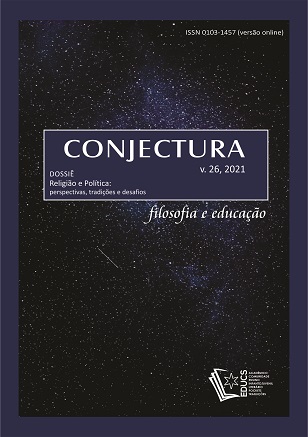Religions and the neoliberal modus operandi: faith as an à la carte product
DOI:
https://doi.org/10.18226/21784612.v26.e021049Abstract
The lasciviousness of religious discourses engenders an astonished capacity to attract and pervert the faithful. As the only interpreters of the sacred text, the orthodox version relies on a fundamentalism that dulls critical capacity. Anyone who dares to give another interpretation is considered satanic. One of the references of religious fundamentalism is European pietism, which gradually migrates to the United States. More recently, this religious fundamentalism has arrived in Latin America. In Brazil, it appears under the name “church”, with different and varied denominations. Currently, the notion of fundamentalism encompasses other sectors of social, political, cultural and economic life. On the horizon of a neoliberal economy, “everything”, at least implicitly, becomes a commodity. The triumphalism of the market now considers faith in an à la carte product. Neoliberalism is, then, the prospect for the increasing concentration of wealth, turning faith into an instrument that favors a minority, which is increasingly more advantageous. In the case of Brazil, the proliferation of “churches” further consolidates social and economic inequalities.
Keywords: Religion. Sacred. Faith. Entrepreneurship. Neoliberalism.
References
BALDUCCI, C. Satanismo. In: LEONE, Salvino et al. Dicionário de bioética. Vila Nova de Gaia: Editorial Perpétuo Socorro; Aparecida: Editora Santuário, 2001. p. 1003-1005.
BOMFIM, M. A América Latina: males de origem. Rio de Janeiro: Topbooks, 2005.
BOUREL, D. Pietismo. In: CANTO-SPERBER, M. Dicionário de ética e filosofia moral. São Leopoldo: Editora da Unisinos, 2002, v. 2, p. 336-339.
CORTINA, A. Aporofobia, el rechazo al pobre: un desafío para la democracia. Barcelona; Buenos Aires; México: Paidós, 2017.
DOUGLAS, M. Pureza y peligro: un análisis de los conceptos de contaminación y tabú. 2. ed. México: Madrid: Bogotá: Siglo Veintiuno, 1991.
DREHER, M. N. Para entender fundamentalismo. São Leopoldo: Editora da Unisinos, 2002.
FROMM, E. La patología de la normalidad. Barcelona; Buenos Aires: Paidós, 1994.
GARCÍA-MARZÁ, D. et al. Introducción. In: GARCÍA-MARZÁ, D. y Outros. Homenaje a Adela Cortina. Ética y filosofía política. Madrid: Tecnos, 2018. p. 11-14.
GARZANTI, Enciclopedia di Filosofia. Milano: Garzanti Editore, 1981.
GRÜNER, Eduardo. La oscuridad y las luces. Buenos Aires: Edhasa, 2010.
HABERMAS, J. Fragmentos filosófico-teológicos. Madrid: Trotta, 1999.
HABERMAS, J. Mundo de la vida, política y religión. Madrid: Trotta, 2015.
HONNETH, A. La sociedad del desprecio. Madrid: Trotta, 2011.
HOUAISS, Dicionário Eletrônico da Língua Portuguesa. Rio de Janeiro: Editora Objetiva, 2001 (versão CD).
LANCEROS, P. Religión. In: ORTIZ-OSÉS A.; LANCEROS, P. Diccionario de hermenéutica. Bilbao: Universidad de Deusto, 2004. p. 489-491.
MAIA, A. F. B. Fenômeno religioso, crítica filosófica e secularização. In: MAIA, A. F. B. Filosofia & Religião. Fenômeno religioso no mundo (pós)secular. Porto Alegre: Editora Fi, 2018. p. 109-126.
MARTIN, D. A. Fundamentalismo. In: OUTHWAITE, W.; BOTTOMORE; T. Dicionário do pensamento social do século XX. Rio de Janeiro: Zahar Editor, 1996. p. 328-330.
PIZZI, J. “Sobre o tema: Deus provavelmente não existe: agora pare de se preocupar e curta a vida”. In: PIZZI, J.; ORTH, M. A.; OTTE, J. Diálogo Crítico Educativo VII: Interlocuções II. Pelotas: Editora da UFPel, 2017. p. 155-170.
PIZZI, J. Prólogo à edição brasileira. In: SALAS, A. R. O sagrado e o humano: para uma hermenêutica dos símbolos religiosos. Nova Petrópolis: Nova Harmonia, 2018. p. 19-33.
PIZZI, J. Más allá de una pedagogía bipolar: la perspectiva triangular de la epistemología. In: GENIS, A.; HARDT, L. S. La idea del maestro en la tradición filosófica y educativa. Montevideo, 2019. p. 315-327.
PIZZI, J. Un café filosófico post-dictaduras con el fin de pensar otra vez lo que ya hemos pensado. In: MAESSCHALCK, M. et al. Luchas sociales, justicia contextual y dignidad de los pueblos. Santiago: Ariadna Ediciones, 2020. p. 205-220.
RACHELS, J; RACHELS, R. A coisa certa a fazer. 6. ed. Porto Alegre: McGrawHill, 2014.
SALAS ASTRAIN, R. Lo sagrado y lo humano: para una hermenéutica de los símbolos religiosos. Santiago de Chile: San Pablo, 1996.
SALAS ASTRAIN, R. O sagrado e o humano. Para uma hermenêutica dos símbolos religiosos. Nova Petrópolis: Nova Harmonia, 2018.
SANDEL, M. J. O que o dinheiro não compra. Rio de Janeiro: Civilização Brasileira, 2012.
Downloads
Published
How to Cite
Issue
Section
License
1. The publication of the originals will imply the assignment of copyright to Conjectura Journal.
2. Texts cannot be reproduced without authorization from the Journal after acceptance.









